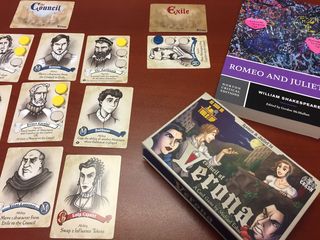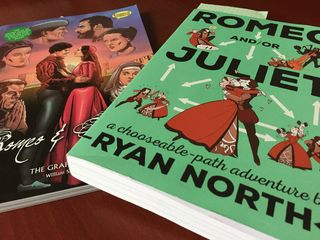Play
Playing with Shakespeare
Using games, graphic novels, and other adaptations in the classroom.
Posted June 11, 2018

I’ve realized recently that some of my introductory literature students aren’t all that excited about sitting and reading long books. Raised on a steady diet of video games, electronic devices, tweets, and texts, contemporary students don’t always have a lot of patience for hours of reading.
I’m also learning that one of the ways around this dilemma is to teach adaptations of more challenging texts, and in so doing to talk with the students not just about the original text itself, but about the power and process of adaptation.
At the moment, I’m preparing to teach William Shakespeare’s Romeo and Juliet this fall, and I’ve been gathering together games, graphic novels, films, and other adaptations that I can teach in conjunction with the play.
One of these is a small card game called Council of Verona. Released a few years ago by Crash Games, Council of Verona is a fairly simple card game that’s easy to play and learn. The game includes cards for each of the major characters in the play, and over the course of the game players place their cards in areas marked as “Council” or “Exile.” Some of the cards can receive little markers called “influence tokens,” and others have abilities that allow for certain actions.
It’s a fairly simple, quick game, and it only roughly follows the major plot points and character motivations of the play. It’s fun, though, and it’s something I hope will spark my students’ interest and maybe even inspire them to want to read the play itself.
In addition to playing this game, I’m planning on having my students read a new novel by Ryan North called Romeo and/or Juliet: A Chooseable-Path Adventure, which includes modernized and humorous storylines. We'll also be reading a graphic novel based on the play and watching some films inspired by it, including West Side Story. In a reverse direction, we’ll be looking at some of the texts that inspired Shakespeare himself, including the myth of Pyramus and Thisbe as told in Ovid’s Metamorphoses, as well as other prior tellings of the Romeo and Juliet tale.

Some might think that such adaptations are far afield of the original text, but I’d argue that teaching adaptations -- particularly of Shakespeare's plays -- makes a lot of sense. Many of his plays were based on earlier sources, after all, and he specialized in the art of adaptation.
And besides, in bringing texts like these into the classroom, I'm teaching the students not just about Shakespeare, but about the process of adaptation itself. There are psychological and educational benefits to learning that there’s not one way to do something, and that texts evolve over time.
It’s that ability to adapt that I want to teach my students, more than any particular text itself. They’ll be able to use this skill throughout their lives, whether they’re reading tweets or texts, long novels or blips on a screen. And hopefully they’ll grow to understand that they, too, can adapt over time – continually revising, rethinking, and re-envisioning their own stories and lives.


